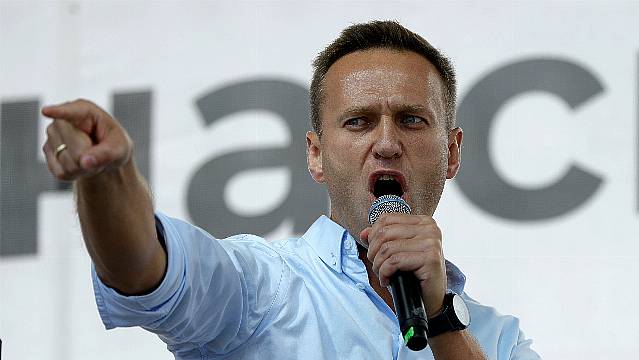A preliminary inquiry launched last week has not found any indication of “deliberate criminal acts committed against” Mr Navalny, Russia’s Prosecutor General’s office said on Thursday.
The statement comes amid growing pressure from the West to investigate the sudden illness of the Kremlin’s fiercest critic and authorities’ apparent reluctance to do so.
Mr Navalny, one of President Vladimir Putin’s fiercest critics, fell ill on a flight back to Moscow from Siberia last Thursday and was taken to a hospital in the Siberian city of Omsk after the plane made an emergency landing.

Over the weekend, he was transferred to the Charite hospital in Berlin, where doctors found indications of “cholinesterase inhibitors” in his system. But a specific substance has not yet been identified.
Found in some drugs, pesticides and chemical nerve agents, cholinesterase inhibitors act by blocking the breakdown of a key chemical in the body, acetycholine, which transmits signals between nerve cells.
Mr Navalny’s allies insist he was deliberately poisoned and say the Kremlin was behind it, but Moscow officials have branded the accusations “empty noise”.
Mr Navalny’s team submitted a request to Russia’s Investigative Committee, demanding authorities launch a criminal probe on charges of an attempt on the life of a public figure last week, but said they received no response.
Kremlin spokesman Dmitry Peskov said on Monday he sees no grounds for a criminal case until the cause of the politician’s condition is fully established.

On Thursday, Russian police said they have been conducting a preliminary probe – an inquiry to determine whether a criminal investigation should be launched – to “establish all the circumstances of the incident”.
The announcement about the inquiry came after multiple Western and European officials – including German Chancellor Angela Merkel, British Prime Minister Boris Johnson and US Secretary of State Mike Pompeo – called on Russia to start a full and transparent investigation into Mr Navalny’s condition.
On Wednesday night, the politician’s illness was discussed in a phone call between Mr Putin and Italian Prime Minister Giuseppe Conte.
According to the Kremlin, Mr Putin pointed out on the call that “premature and unfounded accusations” are unacceptable and he underscored Russia’s “interest in a thorough and objective investigation of all the circumstances of the incident”.
German Foreign Minister Heiko Maas on Thursday once again urged Moscow to investigate Mr Navalny’s condition.
“We still expect of Moscow that a contribution be made from there for things being cleared up,” Mr Maas said in Berlin ahead of a meeting with his counterparts from other European Union countries.
“Otherwise, conjecture and speculation will remain that certainly won’t improve relations between Germany and Russia, and also relations between the EU and Russia, but will continue to weigh on them.”







